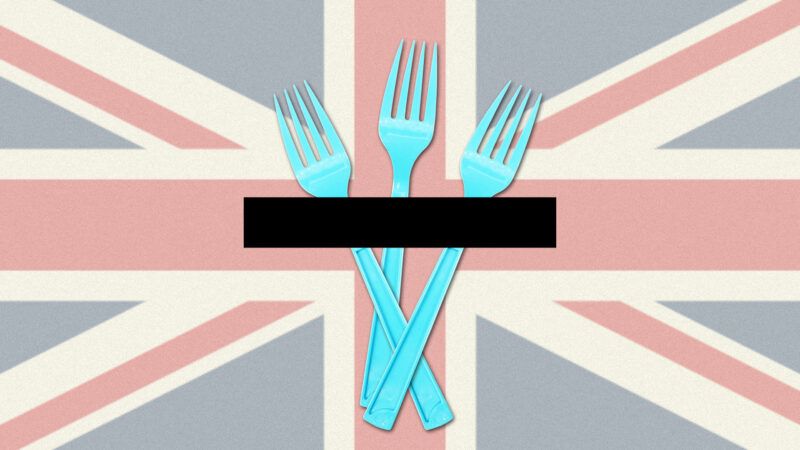Britain's Conservative Government Sticks It to Consumers With Plastic Fork Ban
The country's new ban increases costs for businesses while doing nothing to address the problem of global plastic pollution.

The British government is continuing its long, fruitless war on single-use plastics with the announcement that it will be prohibiting plastic plates and cutlery in England.
"A plastic fork can take 200 years to decompose—that is two centuries in landfill or polluting our oceans," said United Kingdom Environment Secretary Thérèse Coffey to The Daily Mail over the weekend. "This new ban will have a huge impact to stop the pollution of billions of pieces of plastic."
Since October 2020, the British government has enforced a ban on providing plastic straws, stirrers, and cotton buds to customers in England. The regional governments of Scotland and Wales have adopted similar policies.
Details are still pending on what precisely will be prohibited by the U.K. government's new ban. The Daily Mail reports that it will target plastic plates, cups, and utensils distributed by restaurants but not grocery stores.
Some environmentalists are already criticizing the new ban for not being comprehensive enough. "This is like reaching for a mop instead of turning off the tap," said a Greenpeace U.K. spokesperson to The Guardian. The group wants far broader restrictions on the use of plastics.
But the truth is, regardless of how much plastic is being banned, these are all fights on the margins of the global problem of plastic pollution.
The vast majority of plastic that ends up in waterways and oceans is sourced from East Asian, African, and South American countries with poor waste management systems. Rich countries produce a lot more plastic waste, in aggregate and per capita, but almost all of it ends up in landfills, recycling plants, or incinerators.
Our World in Data notes that the U.K. produces twice as much plastic waste as the Philippines but that the average Filipino produces 100 times the mismanaged plastic as the average Briton. Overall, the U.K. is estimated to be responsible for about 0.05 percent of global marine plastic waste—not counting "recycled" plastic that is exported to other countries where waste mismanagement rates are high.
That's not nothing. But even if the British contribution to marine plastic waste were completely eliminated, the general problem of plastic pollution would not be affected.
(One 2020 study found that factoring in illegal dumping and mismanaged exported plastic waste significantly increased the share of global marine waste the U.S. was responsible for. It's possible similar treatment of the U.K.'s plastic exports would also bump up its numbers too. If that's true, the most immediate solution would be to send more plastic to domestic landfills instead of exporting it.)
Those marginal benefits have to be weighed against the costs of a ban, both to the environment and to individual choice and convenience.
When news of England's impending plastic fork ban surfaced last year, CNN wrote that "single-use plastics are also accelerating climate change, as most are derived from fossil fuels and produce emissions at every stage of their lifecycle."
The same could be said of steel and ceramic replacements for single-use dishes and cutlery. Their production, distribution, and discard will also produce emissions. Reusable plastic substitutes will also require water and energy to clean.
It's possible that could all create a net increase in emissions. One 2019 study on plastic bag bans found that replacement cotton tote bags would need to be reused 131 times in order to have the same impact on climate change as a single-use plastic bag.
Obviously, there's a reason businesses and consumers are using plastic utensils now instead of widely available alternatives: They're cheaper. Small business owners in the U.S. have complained that straw and Styrofoam bans add significantly to the costs of operating their businesses.
Those costs likely outweigh whatever environmental benefits will come from an exceedingly marginal reduction in global marine plastic waste.
This doesn't mean nothing can or should be done about the serious problem of plastic pollution.
"Domestic strategies to reduce plastics in [rich] countries will not make much difference to ocean plastics. What rich countries can do is support low-to-middle income countries in improving waste management infrastructure," wrote Our World in Data's Hannah Ritchie in a May 2021 analysis. "Improving waste management is a solution that very few people get excited about. But it's absolutely key to tackling plastic pollution."
That certainly sounds like a better idea than micromanaging when and where Englishmen can use a plastic fork.
Rent Free is a weekly newsletter from Christian Britschgi on urbanism and the fight for less regulation, more housing, more property rights, and more freedom in America's cities.


Show Comments (95)